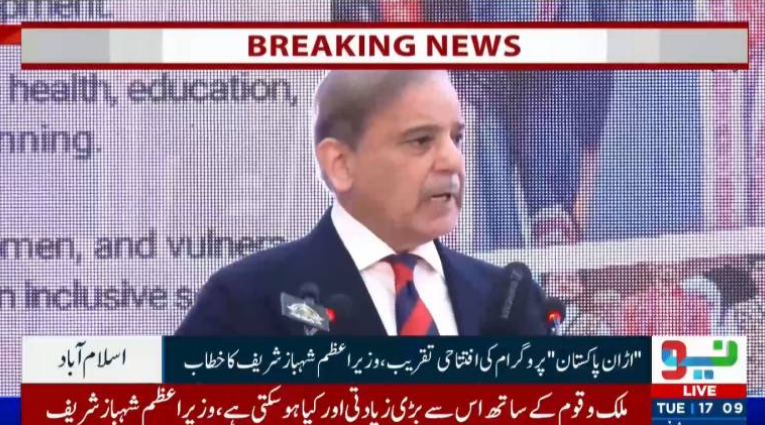Islamabad (Web Desk): Prime Minister Shehbaz Sharif on Tuesday launched the 'Uraan Pakistan', a five-year National Economic Transformation plan 2024-29.
Addressing the ceremony, PM Shehbaz reflected on the severe economic challenges Pakistan faced in 2023, when the country was on the verge of default.
He recalled how, in those difficult moments, the government chose to put the nation’s survival ahead of political considerations.
“When the country teetered on the brink of default, we prioritized rescuing the state over playing political games,” he remarked.
The premier acknowledged the significant hurdles in negotiating Pakistan’s International Monetary Fund (IMF) programme, accusing opposition parties of trying to obstruct the deal.
He condemned these actions as an “injustice to the people of Pakistan,” and emphasized that, despite these challenges, the government managed to bring the country back from the edge. “We have secured economic stability,” he declared, referring to the steady progress made since the crisis.
PM Shehbaz praised the exceptional collaboration between government bodies and institutions, which he called unprecedented.
"I have never seen such cooperation," he said, adding, that this unity must remain as we move forward, determined to learn from past mistakes.
Addressing the people of Pakistan, the premier expressed gratitude for their resilience during a time of economic hardship.
He reassured them that the current economic stabilization was just the beginning.
“The road ahead is long, but we are on the right path,” he said, stressing that sustainable growth was achievable through continued effort.
The prime minister also pointed to the foreign policy shortcomings of the previous administration, criticizing their handling of international relations which, according to him, had left Pakistan isolated on the global stage.
“We must repair these ties and restore our place among the global community,” he asserted.
Sharif laid out ambitious goals for the future, with a focus on driving forward economic reforms.
He expressed confidence that Pakistan’s current agreement with the IMF would be the last, and that the country could build a self-sustaining economy.
"Through hard work, we will transform our economy," he affirmed.
He highlighted several positive indicators, including a reduction in inflation, improved institutional collaboration, and growing investor confidence.
However, the premier also underscored the need for significant reform in the energy sector, acknowledging that high electricity costs were a barrier to sustainable development. “Our future cannot be dependent on expensive energy," he said, expressing his hope to reduce taxes in the future to boost economic growth.
Earlier, speaking at the event, Finance Minister Muhammad Aurangzeb also elaborated the objectives of the Uraan Pakistan initiative.
He revealed that the program aims to position Pakistan's economy on the global map within the next three years.
Aurangzeb highlighted key achievements under the current government, including the nation’s first fiscal surplus in 24 years, a dramatic decline in inflation from 38% to 5%, and a drop in the central bank’s policy rate from 22% to 13%.
Additionally, he pointed to Pakistan’s stock market, which has now become one of the world’s top performers, a sign of increasing investor confidence both at home and abroad.
The finance minister emphasized that the Uraan Pakistan initiative is not just a short-term solution but a long-term strategy for economic stability and sustainable growth.
“This is a historic moment for Pakistan’s economic future,” he concluded, stressing that the reforms being put in place would transform the country’s economic trajectory.
It is pertinent to mention that the ‘Uraan Pakistan programme’ is seen as the cornerstone of a broader strategy to secure long-term prosperity, restore international trust, and make the country’s economy competitive on the global stage.


